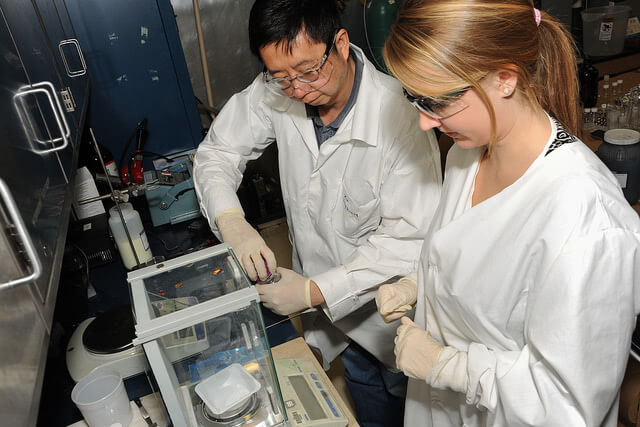
Source: Flickr user rdecom
A research university is known for being large and focusing heavily on research. In addition to offering numerous undergraduate degrees, research universities are committed to graduate education through the doctorate degree.
The size of research universities can be a turn off for many students who want a more intimate college experience. However, most students at large universities can find very intimate communities within their large campus. Attending a large university can also have many advantages, including very active student organizations, many student activities, and great professors.
While large, research universities are not for everyone, they have a lot of advantages students can appreciate.
Here are ten reasons to consider attending a research university:
1. University reputation
Some of the top research universities in the United States include Columbia University, Massachusetts Institute of Technology (MIT), Stanford, Harvard, UC Berkeley, and UCLA. Most people have heard of these institutions, including employers who may be more likely to interview and hire someone from a well-known university.
2. Access to experts at a research university
It is very likely students at research universities will have professors who are well known in their field. Professors will most likely have been published in academic journals, books, and even textbooks.
Some professors may even be known throughout the world because they serve as experts on television, in documentaries, or in popular publications. Most professors at research universities know their subjects well and are very passionate about the discipline.
3. Experienced, enthusiastic professors
Individuals who dedicate their life to research on a specific subject are usually very passionate about the subject. This passion for the subject they study usually follows them into the classroom as they are teaching their undergraduate students.
Instead of presenting a boring lecture in a monotone voice, many professors at research universities will bring passion to the classroom. Their love for the subject will come through in the lecture in the form of enthusiasm.
4. Professional and academic connections at a research university
Professors at large universities get a bad rap. Many think professors at research universities do not have time to make meaningful connections with their undergraduate students.
While this may be true for some professors, it is certainly more then exception than it is a rule. Students may have to reach out to their busy professors, but many are happy to answer questions and serve as mentors and role models. These meaningful relationships can lead to wonderful letters of recommendation if students need them for graduate school or jobs after graduation.
5. Courses incorporate the latest research
Professors at research universities conduct research and are very likely to stay on top of breaking developments in their discipline. Many of these professors will share the latest research information with their students at all levels, including undergraduate students. Some of the information shared in classes will not be in textbooks because the discoveries could have just happened within the last few days.
6. State-of-the-art facilities
Educating students is just one thing that happens at research universities. University professors, as well as government agencies, businesses, and organizations, conduct research on these campuses.
To perform the research, universities need to have immense libraries and the latest equipment. Undergraduate students usually have access to these facilities, and may have the opportunity to use the extravagant equipment that smaller colleges could only dream of having on their campuses.
7. More-specialized majors
Many of the research universities have large student and faculty populations. This also means there may be many majors to choose from. For example, instead of having just General Biology like many smaller colleges and universities will offer, research universities may have Biochemistry, Biophysics, and Biotechnology, just to name a few.
8. Research opportunities
While not all undergraduate students are able to conduct research, some students get the opportunity to work alongside professors and graduate students as they do research. This can sometimes lead to students getting recognized for their work as a coauthor of a published paper. Any experience with research at the university level will look great on a graduate school, internship, or job application.
9. Graduate courses for undergrads
If students are up for the challenge, some graduate courses may be open to undergraduate students. The courses will be much more advanced and specialized than an undergraduate course. Taking the advanced level courses will give students the opportunity to try out graduate level work and decide if graduate school is the right choice for them after graduation.
10. Networking opportunities at a research university
Researchers often have a lot of connections, and many times they collaborate on the college campuses with other experts in the field. Many student organizations also bring leaders and experts in their fields to talk on campus with students interested in the field.
With so many connections, students have a lot of opportunities to meet individuals in the fields they are considering. These connections they make can lead to mentors, internships and careers.





